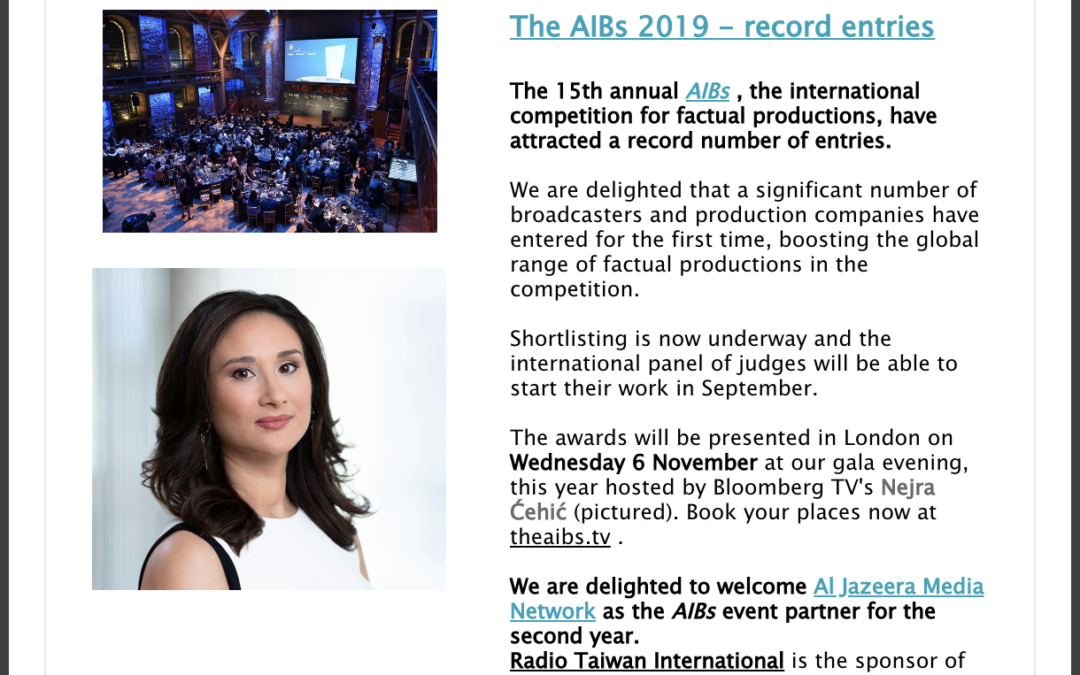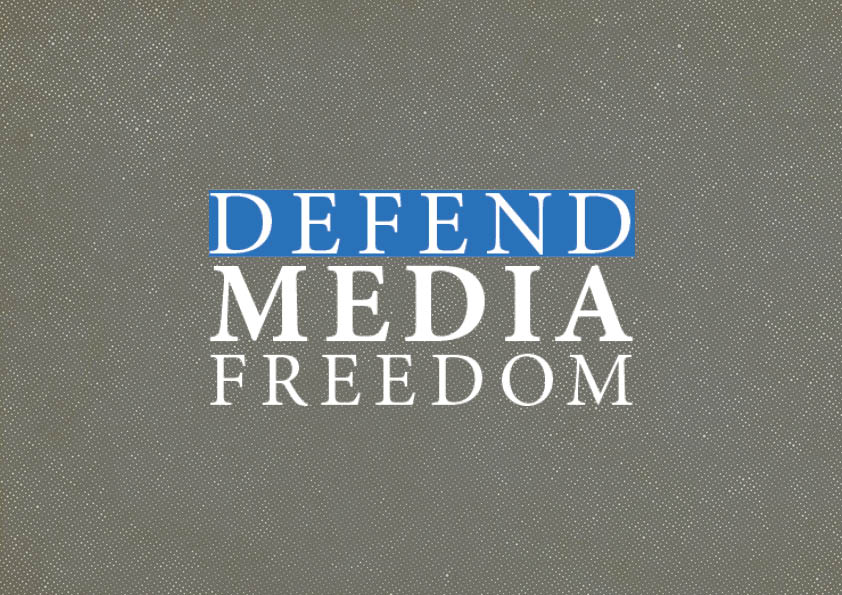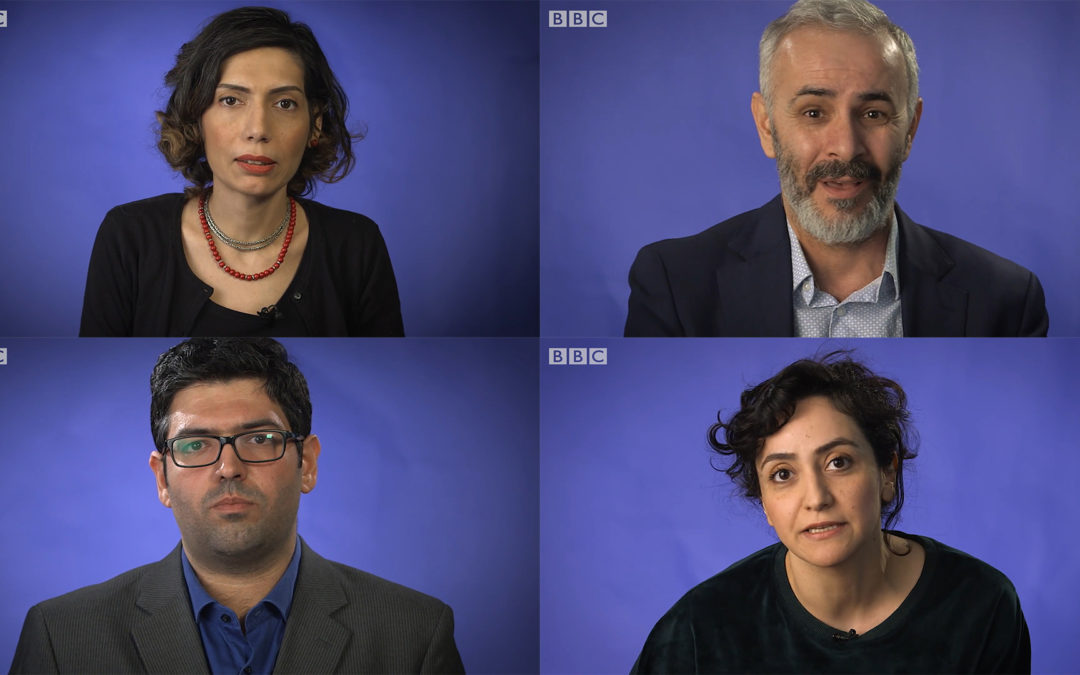
5 August 2019
The AIB has published its latest briefing reporting on selected stories from the global media industry. From media freedom to new appointments, new programming to public service licence fee changes, the regular briefing is received by more than 27,000 people in the media industry globally.
To subscribe, fill out this form and join your industry peers in keeping up to date with news from around the world.

30 July 2019
The Association for International Broadcasting has responded to the Australian parliamentary enquiry into law enforcement & intelligence powers on media freedom. Working with Doughty Street Chambers, the AIB has highlighted issues surrounding Australia’s legislation and the way it has been framed to potentially prevent or restrict journalists from covering stories of significant public interest. Following the raids on the ABC and on journalists working for NewsCorp publications and associated international outcry, the Australian Parliament has convened this inquiry. Submissions will be accepted up until 6 August 2019.
“The raids on the ABC and on journalists in Australia marked a low point in media freedom in Australia,” comments Simon Spanswick, AIB chief executive. “We are glad that this inquiry has been established. It is time for legislators in Australia to recognise that restrictions on journalists working in the country must not be continued or increased. Australia has a vital role to place in the Indo-Pacific region in promoting rule of law and media freedom.”
Read the submission here.

27 June 2019
We’d set the deadline for entering the AIBs 2019 as 28 June. But we’ve been asked to extend this by many organisations who cannot meet the original closing date.
The new closing date for the AIBs is now 12 July 2019.
There’s plenty of time to get your work into one or more of the 21 categories that we’re featuring in the AIBs. These range from daily journalism to human interest documentary; sport to science, technology & nature; investigative documentary to domestic affairs. Full information is in the AIBs microsite, at theaibs.tv. Download the entry book here.
 And we have been delighted to see that people continue to talk about the AIBs across the year: the picture above was put on Instagram by UK sports presenter Jake Humphrey. The picture shows an AIB in the MD’s office at UK production company Whisper. The company won an AIB for its coverage of Formula 1 in 2016 (pictured right).
And we have been delighted to see that people continue to talk about the AIBs across the year: the picture above was put on Instagram by UK sports presenter Jake Humphrey. The picture shows an AIB in the MD’s office at UK production company Whisper. The company won an AIB for its coverage of Formula 1 in 2016 (pictured right).

30 May 2019
Members of the Association for International Broadcasting have written to key suppliers to the broadcasting industry urging greater engagement over cyber security. The letter calls on suppliers to broadcasters to ensure that their products – which form critical parts of the broadcast chain – have high-levels of robust security that will help to mitigate the effects of cyber attacks.
The letter is a result of work by the AIB Cyber Security Working Group to identify key issues of concern within Members of the Association for International Broadcasting about the current state of security provided within equipment. The Working Group has been active for the past four years, drawing together the Chief Information Security Officers and Chief Technology Officers across a wide range of AIB Members. Its purpose is to share intelligence about threats and to share knowledge about ways to mitigate attacks on broadcasters.
“The number of attempts to breach the security of broadcasting networks is constantly increasing,” says AIB Cyber Security Working Group chairman and CISO at Arqiva, Denis Onuoha. “Yet the supply side of the industry is not accelerating its work on developing robust security at the same rate. This disconnect is something that the AIB – and other industry associations – is striving to end. We want suppliers to the broadcasting industry to understand the concerns and the needs of broadcasters across the world and to work across the sector to improve security.”
Not every cyber attack is successful. However, the high-profile attacks that have been revealed clearly demonstrate the havoc that can be wreaked when defences are breached. The costs involved in recovering a broadcasting operation following a successful attack run into tens of millions of dollars, while the reputational damage is potentially even more damaging.
“As a global trade association, it is in our DNA to support Members in dealing with challenging subjects, such as cyber security,” comments AIB chief executive, Simon Spanswick. “There is often a reluctance to discuss cyber security, or a hope that an attack ‘won’t happen to me’. This is misguided as it is only through collaboration that the questions that the industry faces can be successfully navigated. The AIB wants to ensure that none of its Members have to deal with the aftermath of a cyber attack and that is why the Association is calling on the supply side of the industry to engage.”
Through its Working Group, the AIB is now in regular contact with the national security services in a number of countries in order to share knowledge and expertise. The Association is developing plans for the creation of a broadcast cyber security research unit within the information security department of a major UK university that will develop a live broadcast production and transmission laboratory where undergraduate and postgraduate research into security of equipment will be undertaken in conjunction with industry.
“All the work that the AIB undertakes on cyber security is of benefit both to Members and the wider industry,” continues Spanswick. “That’s why we’re encouraging the active and supportive involvement by the supply side in our cyber security initiatives. It’s only by working together that the industry can combat the very real threats that exist.”

3 May 2019
As World Press Freedom Day is marked with events across the globe, journalists working at BBC Persian have spoken out about the attempts that the Iranian regime are making to try to silence the broadcaster that has been on the air with radio broadcasts since 1940 and television since 2009.
Watch the video here.



 And we have been delighted to see that people continue to talk about the AIBs across the year: the picture above was put on
And we have been delighted to see that people continue to talk about the AIBs across the year: the picture above was put on 
